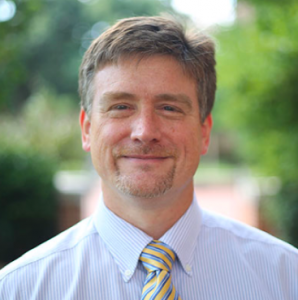
Dr. Greene Shepherd Pharm. D. is a Clinical Professor here at the UNC Eshelman School of Pharmacy (ESOP) and is based on the Asheville Campus. He is a diplomate of the American Board of Applied Toxicology and a fellow of the American Academy of Clinical Toxicology. In this week’s faculty spotlight, Dr. Shepherd was interviewed by Sit with Senate Committee Member Adam Hendrix.
Sit with Senate: How did you begin your career in pharmacy?
Dr. Greene Shepherd: “I went to undergrad at Appalachian State University and wound up getting a job as a technician at Watauga Medical Center. I worked in the IV room there for about 3 years and that’s where I really became interested.”
SWS: How did your career path lead you to ESOP and your current position?
GS: “After pharmacy school, I did a fellowship at the University of Maryland in clinical toxicology and it was at the poison center in the pharmacy school. This is where I was exposed to academia for the first time and had my first academic appointment as a fellow. I got involved with teaching and somehow, I always found myself gravitating towards it. From there I went to the University of Texas Southwestern School of Medicine as a faculty member teaching about poison and overdose. Later on, I worked at the University of Georgia School of Pharmacy as a faculty member on a branch satellite campus. When the opportunity became available to come back to North Carolina to help launch a second campus program, I knew it was a perfect fit for me and luckily everything worked out well. We then launched the program in Asheville in 2011 with the first class.”
SWS: How did you become interested in toxicology? Did anything specific push you towards that?
GS: “It was a combination of many different things. One aspect I really like about poison and overdose, particularly with pediatric exposures, they are very fixable problems. You can take a situation, figure out what needs to be done, and really solve the problem at hand. I can be a fixer and this is different than many other chronic disease states where you can only manage the problems instead.”
SWS: What is your day-to-day like as a professor combined with other commitments (within ESOP and outside ESOP)?
GS: “No two days are the same. I’m involved in teaching in a variety of places. I also wear a hat at the Asheville campus looking at whether students are having a good experience and are supported. I also help make sure many logistical details such as class schedule, etc are taken care of. I’m also one of the leaders of the Practice Advancement and Clinical Education (PACE) division so I help new faculty get adjusted to the school.”
SWS: What do you enjoy most about what you do?
GS: “Helping students figure out what it is they enjoy and want to do. You can’t decide for them, but you can help guide them along the path of discovering something they are passionate about. Once students find that, they usually take it and run. Some people come in knowing what they want to pursue. However, it takes a while for others to figure that out. I was one of those people, so I see this as my way of giving back.”
SWS: What makes Asheville a unique place for pharmacy?
GS: “Asheville has always been a center of innovation for pharmacy practice. There are more Clinical Pharmacist Practitioner (CPP) per capita than any other region of the state. So, there’s a lot of innovative things happening at both the Mountain Area Health Education Center (MAHEC) and Mission Hospital. It really is a good place for good cutting-edge practice.”
SWS: What research are you currently involved in?
GS: “One of the projects I’m currently involved in is sitting on many international panels and writing treatment guidelines for managing poisonings. We have a paper about using activated charcoal that’ll likely come out early next year. We’re also working on several papers on when to use hemodialysis to remove various poisons in patients. So far, that’s what I’ve been up to.”

SWS: What are your interests/hobbies outside of pharmacy?
GS: “Well I have 3 kids, so they keep me busy. Outside of that, I enjoy the outdoors. I particularly like obstacle course racing and adventure races, so I usually do several of those a year.”
SWS: What piece of advice has impacted your career path/life the most?
GS: “It’s not always what you are doing (even though you do need to find something you’re passionate about to pursue), but the people you do that with is incredibly important. You can have a job with a team you work well with that’s fantastic and you love it. However, if you have that same job in a place where it’s dysfunctional and the team dynamic is worse, then you may have a poor experience. Make sure you are part of a team that you’re happy with and your work won’t seem like a burden. This has proven true over and over again in my life.”
